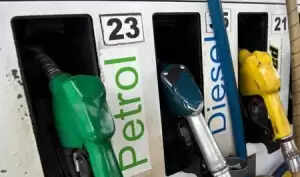Government Boosts Excise Duty on Fuels Amid Falling Global Oil Prices
Excise Duty Increase Announced

In a recent announcement, the government revealed an increase in excise duty on petrol and diesel by Rs 2 each, effective from Tuesday. However, consumers will not see a rise in retail prices due to a decline in global oil prices.
The drop in crude oil prices is expected to lower production costs for oil refining and marketing firms like Indian Oil and Bharat Petroleum, enhancing their retail margins. This adjustment allows the government to generate additional revenue from the excise duty hike without imposing extra costs on consumers.
The Ministry of Petroleum and Natural Gas confirmed on social media that there would be no increase in the retail prices of petrol and diesel following the excise duty adjustment.
PSU Oil Marketing Companies have informed that there will be no increase in retail prices of #Petrol and #Diesel, subsequent to the increase effected in Excise Duty Rates today.#MoPNG
— Ministry of Petroleum and Natural Gas #MoPNG (@PetroleumMin) April 7, 2025
According to the new order, the excise duty on petrol has risen to Rs 13 per litre, while diesel is now set at Rs 10.
This decision is aimed at increasing revenue as crude oil prices have plummeted to a four-year low, with Brent crude now at $63 per barrel, the lowest since April 2021, and US West Texas Intermediate crude at $59.57. As the third-largest importer of crude oil globally, India stands to benefit from these lower prices.
On Monday, oil prices continued to decline, dropping nearly 4% due to escalating trade tensions between the US and China, raising concerns about a potential recession that could reduce crude demand. Additionally, the OPEC+ oil cartel has opted to boost supply.
Brent futures fell by $2.43, or 3.7%, to $63.15 a barrel, while US West Texas Intermediate crude futures decreased by 3.9%, settling at $59.57.
In a recent move, Saudi Arabia, the leading oil exporter, cut crude oil prices for Asian buyers in May by as much as $2.3 per barrel.
The reduction in oil prices is favorable for the Indian economy, which imports approximately 85% of its crude needs. A decrease in oil prices can significantly lower the country's import bill, thereby reducing the current account deficit (CAD) and strengthening the rupee.
Moreover, lower oil prices can lead to decreased costs for petrol, diesel, and LPG in the domestic market, helping to alleviate inflation.
The government has also taken steps to minimize the oil import bill by permitting oil companies to purchase Russian crude at discounted rates, despite Western pressures stemming from the Ukraine conflict. The Modi administration has maintained strong ties with Russia, even amid sanctions imposed by the US and Europe.
Currently, Russia has become India's largest crude oil supplier, surpassing Iraq and Saudi Arabia, which previously held the top positions. India has emerged as the largest buyer of Russia's seaborne oil, accounting for nearly 38% of its total oil imports.
